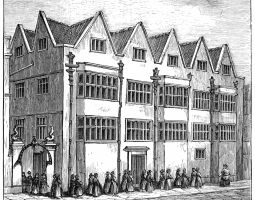Edward Colston (1636-1721), infamous for his part in the slave trade, was also a benefactor in many parts of Bristol. In 1707 he acquired the sugar house and what remained of the Great House and established an all-boys boarding school, known as Colston’s Hospital for Boys (later renamed Colston School), on the site. The object of the founder was 'to educate in the principles of the Church of England, and to maintain and clothe 100 poor boys, and to place them out to apprentice'. Their uniform, a long blue coat, knee britches and yellow stockings, was closely modelled on that of Christ’s Hospital (which Colston had attended himself, and Coleridge too from 1781). The boy-poet, Thomas Chatterton, attended the school from 1760 to 1767. In the summer of 1764, Chatterton produced a pastoral eclogue, entitled "Elinoure and Juga," which he presented to the school's usher Thomas Philips as the work of Thomas Rowley, a secular priest, who lived in Bristol some three hundred years before. The school remained on the site until 1861, when it moved out to Stapleton. The old site is now occupied by the Colston Hall.
Project Layers
- Anti-Apartheid
- Bristol's Industrial Revolution
- Chatterton, Wordsworth and Coleridge
- Deaf community
- Know your Bristol
- Know Your Greenbank
- Knowle West
- Music
- Romantic Era
- Romantic Era Revisited
- Schools
- SMRT family history
- St Katherine's WW1 project
- Theatres of the City
- Vaughan postcard collection
- Women of East Bristol
- Women Writers

